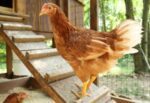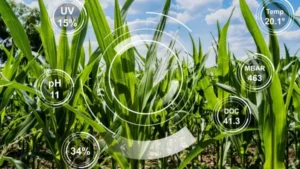Last updated on July 28, 2025
Choosing the right farm management software is one of the most critical decisions a modern farmer can make. The options are vast, the promises significant, and knowing which platform will truly deliver for your specific operation can be challenging.
You’ve come to the right place. To help you cut through the noise, we’ve tested, reviewed, and compared the top platforms on the market, with a special eye on their relevance and benefits for Nigerian farmers. This isn’t just a list; it’s a detailed buyer’s guide designed to help you find the perfect digital command center for your farm, ensuring you maximize yields, minimize waste, and secure your future.
Executive Summary / Key Takeaways
- Strategic Investment: Farm management software is essential for optimizing productivity, reducing costs, and improving decision-making for Nigerian farmers.
- Diverse Needs: The “best” software depends on your farm type (row crops, livestock, diversified) and specific pain points.
- Integration is Key: Prioritize platforms that integrate seamlessly with your existing equipment and other agritech tools.
- User-Friendly Matters: A simple, intuitive interface, especially mobile accessibility, is crucial for adoption and consistent use.
- Beyond Features: Evaluate customer support, data ownership policies, and pricing models to ensure long-term value.
Top Picks / Editor’s Choice
For those looking for quick recommendations tailored to common farm types, here are our top picks:



- Best Overall for Comprehensive Management: Agrivi – For its unmatched comprehensiveness, covering crops, livestock, and financials.
- Best for Row Crops & Data Visualization: Climate FieldView – For its best-in-class data visualization and equipment integration.
- Best for Diversified Farms & Direct Sales: Farmbrite – For its unique combination of production management and integrated sales tools.
- Best for Livestock & Ranching: AgriWebb – A specialized, intuitive platform built specifically for managing herds, grazing, and individual animal records.
- Best for Ease of Use & Simplicity: FarmLogs – Ideal for farmers new to digital tools, offering essential features without overwhelming complexity.
Agricultural Software at a Glance: Top Farm Management Platforms
| Tool | Rating | Ideal Farm Type | Pricing Model | Key Strength |
|---|---|---|---|---|
| Agrivi | ★★★★★ | Mixed Operations / Large Scale | Subscription | All-in-One Functionality, Robust Analytics |
| Climate FieldView | ★★★★☆ | Row Crops (Maize, Soy, etc.) | Per-Acre | Agronomy & Data Visualization |
| Farmbrite | ★★★★☆ | Diversified / Direct-to-Consumer | Subscription (Tiered) | Integrated Sales & Livestock Mgt |
| Granular | ★★★★☆ | Large Agribusinesses | Enterprise / Custom | Financial Analytics & Profitability |
| AgriWebb | ★★★★½ | Livestock / Ranching | Per-Animal / Subscription | Grazing & Animal Record Keeping |
| Tend | ★★★★☆ | Organic / Specialty Crops / CSA | Subscription (Tiered) | Crop Planning & Task Management |
| FarmLogs | ★★★★½ | Small to Mid-Size Row Crops | Freemium / Subscription | Simplicity & Ease of Use |
| Phytech | ★★★★ | High-Value Irrigated Crops | Solution-Based (Hardware + SaaS) | Plant-Based Irrigation Mgt |
| AgExpert | ★★★★ | All Types (Canadian Focus) | Subscription | Dedicated Farm Accounting |
| Taranis | ★★★★½ | Large Scale Growers / Agronomists | Per-Acre Subscription | AI-Powered Disease & Pest Detection |
In-Depth Reviews: The Top 10 Farm Management Software Platforms
Here’s a detailed breakdown of each platform, including their core strengths, weaknesses, and how they might benefit Nigerian farmers.
1. Agrivi: Best All-in-One Platform for Diversified Farms
- Overview: A true all-in-one platform designed to be the single source of truth for complex farming operations, covering everything from crop planning and financials to livestock management. Its comprehensiveness makes it a strong contender for diversified Nigerian farms managing multiple crops and perhaps some livestock, providing a centralized data hub.
- Pros:
- Incredibly Comprehensive: Manages crops, livestock, machinery, inventory, and financials in one place.
- Powerful Analytics: Offers robust agronomic and financial reporting to track profitability at a deep level.
- Cons:
- Can be Overwhelming: Its vast feature set may be too complex for smaller farms or those with simpler needs.
- Best For… Diverse and larger-scale farms that need to centralize all their operational data.
- Pricing: Subscription-based, typically tiered by farm size and required features.
2. Climate FieldView (by Bayer): Best for Row Crops & Data Visualization
- Overview: A leading platform focused on data-driven agronomy. It excels at collecting data from your machinery, visualizing it on field maps, and helping you make smarter planting and input decisions. For Nigerian farmers cultivating staple row crops like maize, rice, or cassava, FieldView’s precision capabilities can significantly boost yields and efficiency.
- Pros:
- Seamless Equipment Integration: Connects effortlessly with most major machinery brands like John Deere and Case IH, crucial for modern mechanized farms.
- Best-in-Class Data Visualization: Its field maps are intuitive and powerful for analyzing yield, soil types, and crop health.
- Cons:
- Limited Financial Tools: Not designed for deep financial management or accounting.
- No Livestock Features: Purely focused on crop production.
- Best For… Row crop farmers who want to optimize yield and make data-driven agronomic decisions.
- Pricing: Subscription-based, typically charged on a per-acre model.
3. Farmbrite: Best for Diversified & Direct-to-Consumer (DTC) Farms
- Overview: A versatile platform designed for the modern diversified farm that often sells directly to consumers. It uniquely bridges the gap between production and sales, which is highly beneficial for Nigerian farmers looking to access direct markets and bypass middlemen.
- Pros:
- Excellent for Mixed Operations: Manages crop planning, livestock records (breeding, health), and equipment tracking seamlessly.
- Integrated Sales Tools: Includes features for managing CSA shares, farmers’ market inventory, and online sales, linking directly to platforms like Square.
- Cons:
- Less Focused on Deep Agronomy: Not as powerful as FieldView for in-depth, variable-rate prescription mapping.
- Best For… Diversified farms, specialty crop growers, and anyone with a direct-to-consumer (DTC) sales channel.
- Pricing: Tiered subscription plans based on the scale and complexity of your operation.
4. Granular (by Corteva Agriscience): Best for Large-Scale Agribusinesses
- Overview: An enterprise-level platform built for large, professional agribusinesses. Its primary focus is on financial performance and operational efficiency at scale. While perhaps overkill for most smallholders, it’s ideal for large-scale commercial farms and agricultural conglomerates in Nigeria seeking to optimize profitability across vast operations.
- Pros:
- Unmatched Financial Analytics: The gold standard for analyzing field-level profitability and making strategic business decisions.
- Powerful Operational Insights: Excellent for managing land leases, work orders, and team productivity across thousands of acres.
- Cons:
- Overkill for Small Farms: Its complexity and cost are not suited for small or mid-sized family farms.
- Steep Learning Curve: Requires significant setup and training to use effectively.
- Best For… Large-scale row crop operations and agribusinesses that need a CEO-level view of their financial performance.
- Pricing: Custom/enterprise-level subscription.
5. AgriWebb: Best for Livestock & Ranching
- Overview: A specialized platform built from the ground up for livestock producers. It’s designed around the practical workflows of managing large herds of cattle or sheep. For Nigerian pastoralists and modern livestock farms, AgriWebb offers robust tools to improve animal health, track productivity, and manage grazing.
- Pros:
- Deep Livestock Features: Excels at individual animal records, mob movement tracking, health treatments, and grazing planning.
- Intuitive Pasture Management: Its visual paddock and pasture management tools are highly praised by ranchers.
- Cons:
- Very Limited Crop Features: Not intended for farms where crop production is a primary focus.
- Best For… Livestock producers and ranchers who need a robust tool for pasture rotation and individual animal tracking.
- Pricing: Typically priced on a per-animal or tiered subscription basis.
6. Tend: Best for Organic & Specialty Crop Farms
- Overview: A favorite among diversified organic and specialty crop farmers. Tend is designed to handle the complexity of growing many different crops with intensive rotation and succession planting schedules. Its visual planning tools are excellent for Nigerian farmers engaging in diverse vegetable or fruit production, especially those supplying niche markets.
- Pros:
- Intuitive Visual Planning: Its drag-and-drop crop planning and field mapping tools make it easy to manage complex rotations.
- Strong Task Management: Excellent for creating and assigning daily tasks to a farm crew, crucial for labor-intensive operations.
- Cons:
- Less focus on heavy machinery integration compared to platforms like FieldView.
- Best For… Small to mid-scale diversified, organic, or specialty crop farms with complex planting schedules and direct sales channels.
- Pricing: Subscription-based, often tiered by farm size or revenue.
7. FarmLogs: Best for Simplicity & Ease of Use
- Overview: A platform focused on simplicity and ease of use. It aims to provide essential farm management tools without the overwhelming complexity of larger systems. Its straightforward approach makes it ideal for Nigerian farmers transitioning to digital tools who need a gentle entry point without being overwhelmed.
- Pros:
- Extremely User-Friendly: Known for its clean interface and low learning curve, making it accessible to less tech-savvy users.
- Good Freemium Model: Offers a useful free version for basic record-keeping and satellite imagery.
- Cons:
- Lacks Advanced Analytics: Not as powerful for deep financial analysis or complex variable rate application scripting.
- Best For… Small to mid-size row crop farmers who need straightforward, intuitive tools for field records and quick insights.
- Pricing: Freemium model with paid subscription tiers for advanced features.
8. Phytech: Best for Plant-Based Irrigation Management
- Overview: A unique solution that combines hardware (plant sensors) and software to manage irrigation based on direct plant stress, not just soil moisture. This is incredibly valuable for Nigerian farmers in arid or semi-arid regions or those growing high-value crops where water conservation is critical.
- Pros:
- Direct-from-Plant Data: Provides an unparalleled view of exactly what your plants are experiencing.
- Proven Water Savings: Highly effective at optimizing irrigation schedules for high-value crops, leading to significant resource efficiency.
- Cons:
- Hardware-Dependent: Requires investment in their proprietary sensors.
- Specialized Focus: Primarily an irrigation management tool, not a full-farm management platform.
- Best For… Growers of high-value irrigated crops (like fruits, nuts, and vegetables) in water-scarce regions. You can learn more about the technology in our detailed guide to the types of sensors used in smart irrigation.
- Pricing: Solution-based model that includes both hardware and software subscription costs.
9. AgExpert: Best for Dedicated Farm Accounting & Financials
- Overview: A platform that puts financials first, offering one of the most robust and dedicated farm accounting systems on the market. While it has a strong Canadian focus, its core accounting features are globally applicable and can provide Nigerian farmers with robust financial tracking vital for securing loans and managing profitability.
- Pros:
- Specialized Farm Accounting: Goes much deeper than the financial modules in other platforms, handling payroll and ag-specific tax reporting.
- Strong Compliance Tools: Excellent for managing inventory and ensuring financial compliance.
- Cons:
- Strong Canadian Focus: Its tax and compliance features are tailored for Canadian farmers, though its core accounting is useful globally.
- Best For… Farmers who need a powerful, dedicated financial management and accounting system first and foremost.
- Pricing: Subscription-based.
10. Taranis: Best for AI-Powered Disease & Pest Detection
- Overview: Not a traditional farm management platform, but a specialized AI-powered scouting and threat detection service that integrates with them. It uses ultra-high-resolution imagery to identify problems at the leaf-level. For large-scale Nigerian farms facing persistent pest or disease challenges, Taranis offers a powerful proactive solution.
- Pros:
- Unmatched Early Detection: Its AI can identify specific weeds, diseases, and nutrient deficiencies with incredible accuracy, often before the human eye can.
- Actionable Insights: Provides precise, geo-located alerts for targeted intervention. Learn how to get started with integrating AI into your existing farm management system.
- Cons:
- A Premium, Specialized Service: It’s an additional cost on top of a standard farm management platform.
- Best For… Large-scale growers and agricultural consultants who need the absolute highest level of in-season threat detection.
- Pricing: Per-acre subscription model.
A Practical Buyer’s Guide: How to Choose the Right Software
Now that you’ve seen the options, how do you make the final decision? Follow this process.
How to Effectively Demo Farm Software
A demo is your most important tool. Don’t just watch their pre-recorded video. Insist on a live demo and follow these tips:
- Use Your Own Farm’s Data: Provide them with data from one of your fields. Seeing the software work with your own information is far more insightful than their perfect sample data.
- Test the Mobile App: Ask them to show you the mobile app. Better yet, test it yourself in an area of your farm with poor connectivity to see how its offline capabilities truly work – a crucial factor for many Nigerian rural areas.
- Involve Your Team: Have the key people who will be using the software (e.g., your farm manager, your agronomist) sit in on the demo. They will ask questions you might not think of, ensuring it fits your specific operational needs.
5 Key Questions to Ask a Sales Rep Before You Buy
- “Show me exactly how your platform integrates with my [John Deere tractor/local weather station/specific drone]. Can you demonstrate it live?” (Tests compatibility with your existing agricultural robotics and automation hardware).
- “What does your customer support look like? What are the hours, is it an extra cost, and what is your average response time?” (Tests quality of support, essential for troubleshooting in Nigeria).
- “Who owns my data? What happens to my data if I choose to cancel my subscription?” (Tests data security and ownership, a growing concern).
- “What are all the potential fees beyond the subscription price? Are there charges for setup, training, or data storage overages?” (Tests for hidden costs, crucial for budget planning).
- “What new features or integrations are on your product roadmap for the next 12 months?” (Tests their commitment to innovation and future relevance).
Understanding Per-Acre vs. Per-User Pricing: Which is Right for You?
- Per-Acre Pricing: Common for row crop platforms like FieldView. You pay based on the size of your farm. This is best if your operation is large but your team is small.
- Per-User Subscription: Common for diversified farm platforms like Farmbrite or Tend. You pay a flat fee for a certain number of users. This is more cost-effective if you have a smaller land base but a larger team (e.g., for harvesting specialty crops).
How We Reviewed These Tools
To provide you with the most accurate and helpful recommendations, our review process involves several key steps:




- Hands-On Testing: We conducted demos of each platform to assess its user interface, features, and overall workflow, simulating common farming tasks.
- Feature Analysis: We systematically compared each tool against a comprehensive checklist of over 50 key features, ranging from crop planning and yield mapping to financial reporting and livestock management capabilities.
- Industry Research: We thoroughly analyzed expert reviews from agricultural technology publications, aggregated farmer testimonials from reputable forums, and studied public case studies to gauge real-world performance and user satisfaction.
- Local Relevance Filter: Every platform was rigorously evaluated on its specific applicability to the Nigerian farming context. This included assessing factors like offline capability, cost structure feasibility for local markets, ease of mobile access, and support for crops and practices common in Nigeria.
Frequently Asked Questions (FAQs)
What is farm management software?
Farm management software helps farmers plan, monitor, and analyze farm operations, from planting and harvest to livestock and financials, all in one digital platform.
How can farm management software specifically benefit Nigerian farmers?
It helps Nigerian farmers optimize yields, reduce post-harvest losses, make data-driven decisions in the face of climate change, and gain better access to markets and finance.
Is internet connectivity always required for these software tools?
While many features require internet, some platforms offer offline capabilities for field data entry, which is crucial for rural areas with inconsistent connectivity. Data syncs when a connection is available.
Can these software tools integrate with my existing farm equipment?
Many leading platforms offer integrations with major farm equipment brands and other agritech tools, allowing for centralized data collection and streamlined operations.




How do I choose the best software for my farm?
Start by assessing your farm’s specific needs, budget, and the problems you want to solve. Then, utilize demos, ask critical questions about integration and support, and consider the mobile experience.
What is the “cloud” in cloud-based farming tools?
“Cloud” refers to internet-based computing where data and software are stored and accessed over the internet, rather than directly on your computer or farm. This allows for remote access and real-time updates.
Conclusion: Your Digital Command Center for a Prosperous Farm
There is no single “best” farm management software. The ideal platform is the one that solves your farm’s most pressing problems, fits your budget, and is easy enough for your team to use consistently. Making the right choice here is a powerful step towards building a more efficient, profitable, and data-driven farm in Nigeria.
Use the in-depth reviews and the buyer’s guide above to narrow down your top 2-3 choices, then demo them thoroughly. Remember, these software tools are the command center for a wider ecosystem of agritech innovations. To explore the hardware, sensors, and other technologies they connect with, read our Ultimate Guide to Agritech in Nigeria and discover more about top agritech innovations that will shape Nigerian farming.



Have you used one of these platforms? Share your experience in the comments below to help other Nigerian farmers make the right choice!


